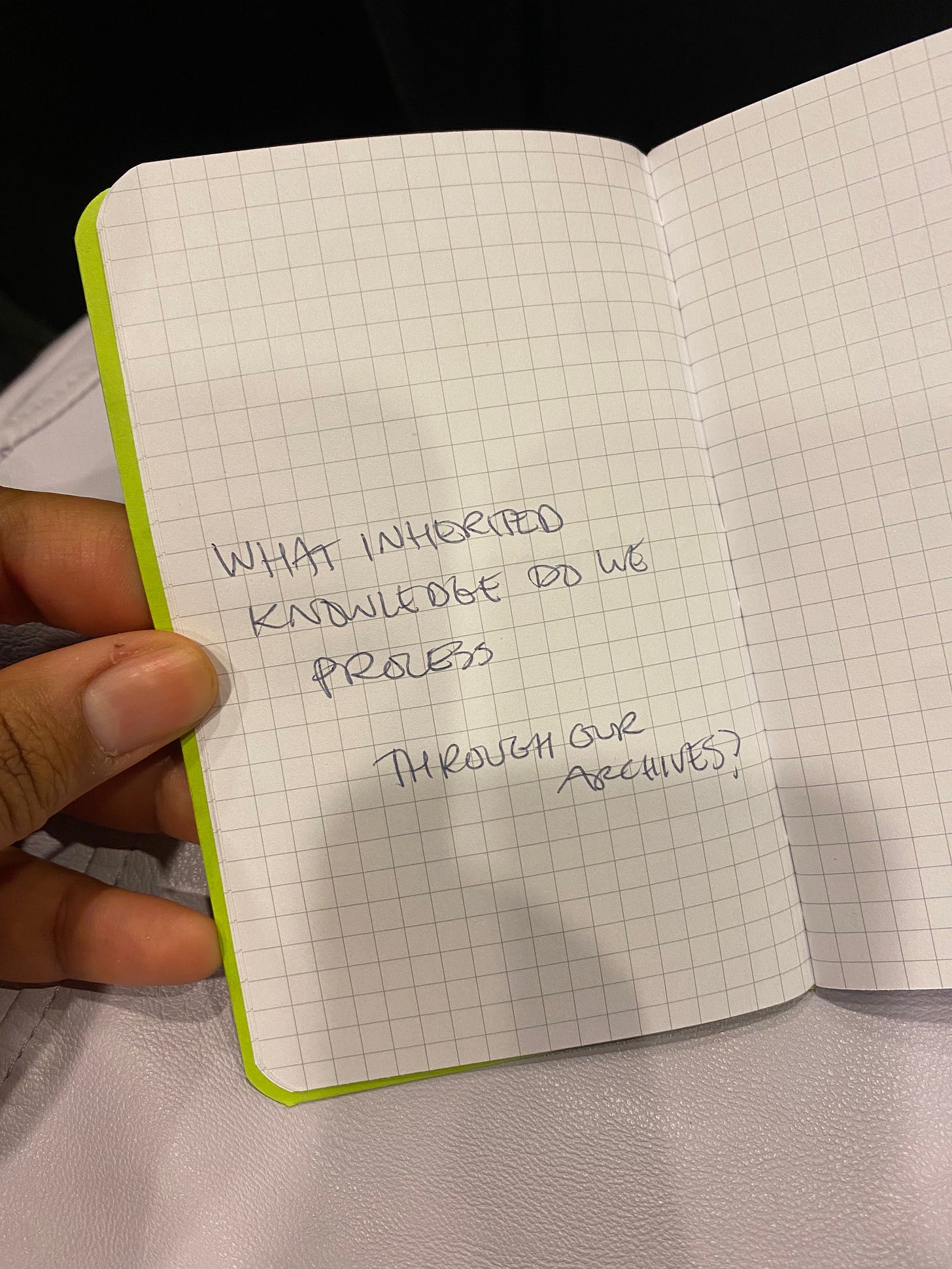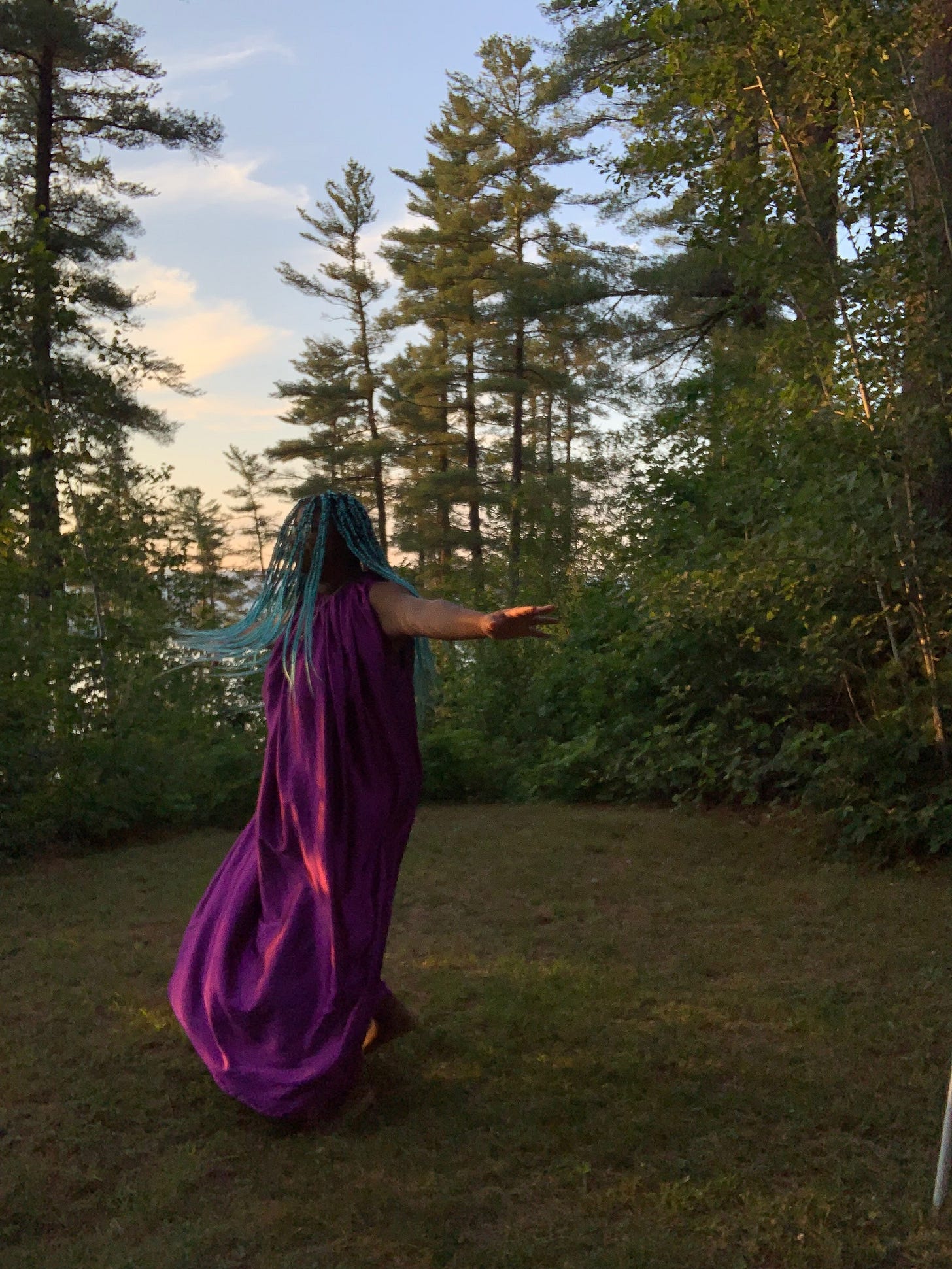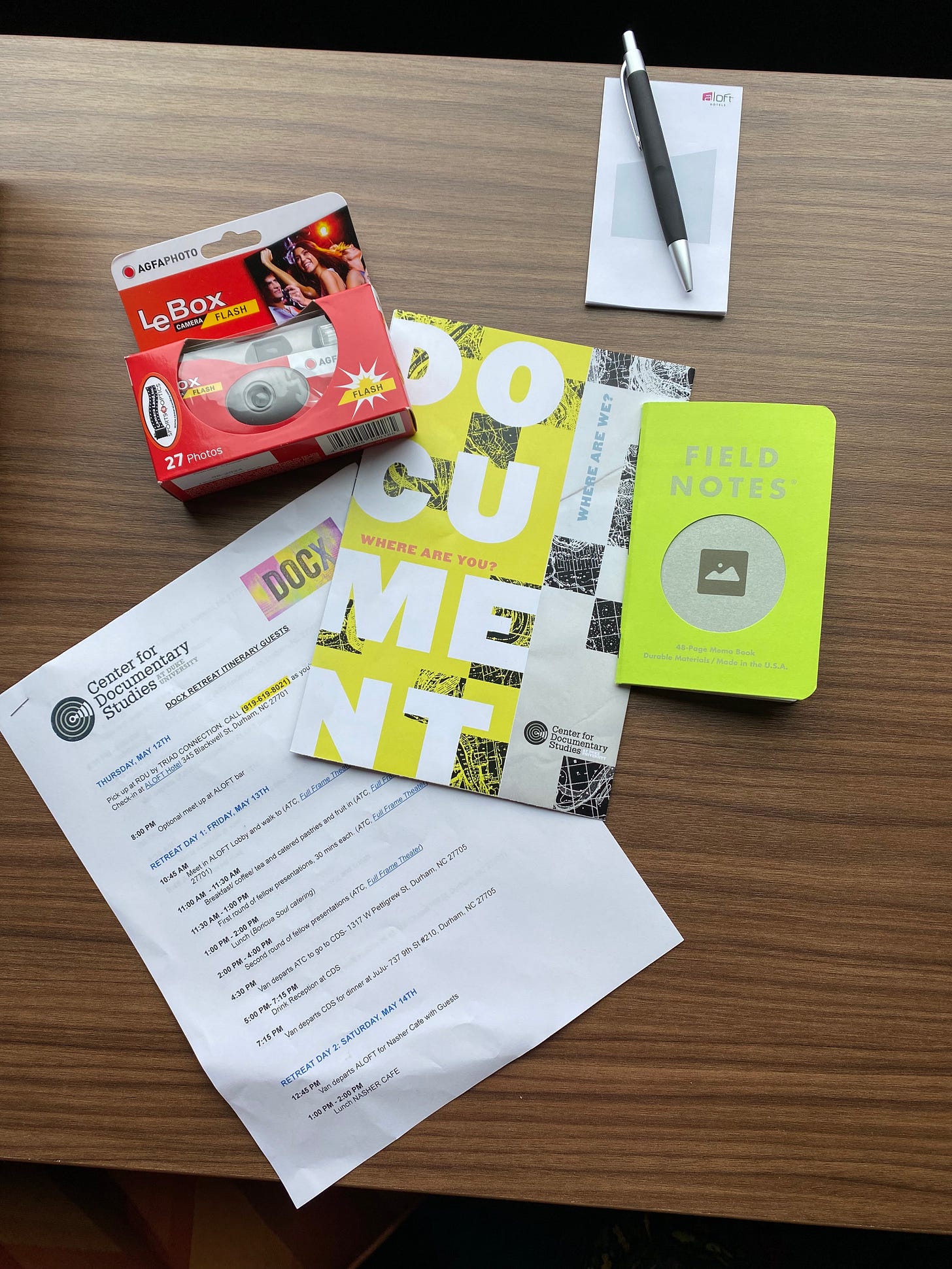It’s been a while. The wheels of transformation have been turning in my life. Brutally. Last spring I lost my housing in Portland, Maine, and subsequently my ability to work as the conditions and stress of being unhoused and underinsured unraveled the progress of my TBI recovery.
Finally, I am happy to share that, after being momentarily crushed by the collapse of my pre-brain injury life, I’ve stabilized and am moving forward into the next chapter— Starting with an acceptance to the Experimental and Documentary MFA at Duke University!
[Field notes from my first trip to Duke’s Center for Documentary Studies in 2022]
That’s right. I’m pivoting. To Art. 10 toes down. It’s either very optimistic or very pessimistic to be a student at this time, but…Life’s a recession then you die, so lets gooooo!
Regardless of the admissions outcome, I was committed to the process of updating my interior narrative about the last few very difficult years of my life and career. I thrived professionally because I am a goal-oriented self-starter who thrives in chaos and excels at creative problem solving. That is, until I developed post-concussion syndrome in 2020. It took three years to establish specialist care; more than one told me that my brain would never fully recover if I tried to keep working as a fulltime producer.
Listen : What Does a Podcast Producer Do
The lack of sleep, constant stress, cognitive load and visual and audio processing strained my brain and body in ways that required deep rest and pacing in order to maintain. Even teaching as an adjunct professor proved unsustainable, both physically and financially. And spiritually. Frankly, it did not feel in good faith to continue to encourage students to take on thousands of dollars of debt for hopes at an industry that can barely support the people who currently create it.
The podcast bubble is bursting. AI is filling labor gaps and even shows that I developed and helped sell to major distributors don’t have the budget to keep me as a series editor. The future of podcasting felt bleak to me. However despite that, i began independently developing two projects very close to home (and my heart). I am reluctant to call them “podcasts” since that only describes the delivery method.
The things I yearn to make don’t exist yet— and I don’t have language for it.
And so I am compelled to investigate: One, the story of finding my long lost paternal family and their legacy as Free People of Color in North Carolina, called Black Hope. The other, tentatively titled “House of Freedom” centers Portland Maine’s Black-led abolitionist community and their politcal and spiritual home, one of the oldest Black meetinghouses in the nation, The Abyssinian.
[Casco Bay during daily dawn walk]
In Portland I walked 5 miles a day, around the sea, unravelling these stories and my own, focused on reporting and recovery. I lead new show development at Molten Heart as a consultant, working just enough to cover my monthly expenses and medical treatments. Yet outside of these touchstones, there was no clear direction forward. I couldn’t even begin to figure out what I wanted and needed if I couldn’t even recognize myself. I sank into the liminal space of who I was and who I was becoming.
Several transformative residencies and retreats lead me back to my creativity and passion for fine art and folk craft. I studied fine art and philosophy in undergrad, concentrating in oil painting and later sculpture. In these spaces, (Hewnoaks and Indigo Arts Alliance, to name a few) I was able to finally dissolve the barrier within myself between my role as an artist and documentarian.
I gave myself permission to be my own subject, to feel —and most importantly—express my own feelings. Instincts which I had long attempted to stifle in the pursuit of journalistic excellence and not being percieved as an “Angry Black Woman”. I am proud of my previous work because it uncovers the truth. At least factually. But more often than not, its emotional truths have been obscured. For “clarity”.
[A whirling dervish of repressed creativity]
One truth I could not escape was that waiting my life away was not working. I was a hollow version of myself; I had lost my sense of purpose. I couldn't do the work that I loved, I felt alienated in a town I loved, and I was alone on a very scary journey. I finally gave up trying to grasp all that I was losing. By summer I found my way migrating south to North Carolina, where caring friends took me in. I spent the next six months watching frogs and hawks and crows go about their lives with such purpose, wondering… what is mine?
When left to my own devices it turns out I do what I’ve done since childhood: write, paint, sculpt, hang out at the library and walk around with a tape recorder. So, naturally, I decided to apply to grad school.
There was only one school on my list: Duke. I was introduced to their robust documentary offerings in 2022 when I was invited to campus as a visiting artist as part of the DocX program at the Center for Documentary Studies. I fell in love with the trees and sweet southern air. I could practically hear my ancestors whispering from the Wake County archives.
[Memorabilia from my first visit to Duke in 2022]
At first, the application’s “The Statement of Purpose” was intimidating. I had been long running on the fumes of outdated ambitions. Piecing together these words helped me to see and appreciate the ways that I’ve committed to my passions throughout my life, and reminded me of other times when that inner clarity guided my decisions. You’d be surprised to find that sometimes your best guidance comes comes from…you.
If you don’t have a Statement of Purpose, I highly recommend you get you one. We got like five End Time scenarios happening simultaneously, so what are you bringing to the Apocalypse Pot Luck?
So without further ado, may I present several excerpts of my *new and improved* Statement of Purpose (bold emphasis when I’m standing ON BUSINESS):
Five years ago when the world stopped, I was flying high at the top of my game in the fledgling, but booming field of podcasting. I had a Peabody under my belt from Uncivil, was fresh from great critical reviews in the national press about Divesting From People Pleasing, with the indie darlings at The Heart…all while leading production on NPR music’s investigation series Louder Than a Riot, and working on my first book with Routledge called Audiocraft: The Art and Business of Making Podcasts That Mean Something (truly a “working subtitle”!)
…
The need to pivot my career due to physical disability coincided with the realization that making work in a sustainable way with undisputed intellectual property requires that I approach my documentary work as art, not commercial product. Furthermore, it pushed me to explicitly distinguish between the form (documentary) and the delivery format (“podcasting”). The podcast industry wants proven results, and returns on its investments, leaving little room for true innovation in form, and restrictions from advertisers around content. The fact is the more podcasting pushes profit, the less creative and more extractive it must be– of the subject and producers.
I used to describe my work as “audio narrative”, but the more I dug into writing Audiocraft and teaching the Salt graduate certificate program, the more questions I had about what makes a narrative legible and who gets to decide? As a trauma survivor, many of my life experiences are fragmented. I weave nonlinear, multidimensional audiocentric storytelling experiences. My stories don't fit the conventional expectations of the assumed audience.
…
I always saw these adventures as practicums for the theoretical aesthetics I was piecing together in my coursework and life. Aesthetics communicate the values of a culture. I want to master and use that language to share phenomenologically embodied histories and interiors; to give voice and agency to the silenced.
[Grad school interview Fit Check!]
Thank you deeply for continuing to support and share my work. Thank you to those who have been my safe harbors through this voyage. I’m so excited for this next chapter of continuing my devoted practices in the fine arts, sound composition and documentary storytelling. Narrative podcasting has opened a door to new ways of experiencing stories as well as a space to document and process untold histories. These vital histories are too powerful to suppress. We will and we must continue to neutralize propaganda with real art.
Not a subscriber but want to tip? 💖 Venmo: @Audiocraft Cashaspp $Audiocraft








